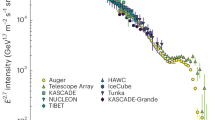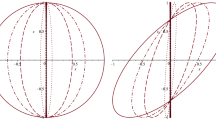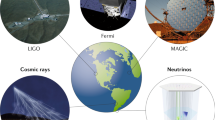Abstract
IT is now well known that a charged particle, moving through a refracting medium at a speed in excess of the phase velocity of electromagnetic waves, produces radiation. The effect is observed with energetic electrons in water and other media, from cosmic ray particles moving through the atmosphere and may also be a source of very low frequency radio waves in the ionosphere and magnetosphere. Its discovery is usually attributed to Čerenkov1 and its theoretical interpretation to Frank and Tamm2, all three of whom were jointly awarded a Nobel Prize in 1958.
This is a preview of subscription content, access via your institution
Access options
Subscribe to this journal
Receive 51 print issues and online access
$199.00 per year
only $3.90 per issue
Buy this article
- Purchase on Springer Link
- Instant access to full article PDF
Prices may be subject to local taxes which are calculated during checkout
Similar content being viewed by others
References
Čerenkov, P. A., Dokl. Acad. Nauk S.S.S.R., 2, 451 (1934).
Frank, I. M., and Tamm, I. Y., Dokl. Acad. Nauk S.S.S.R., 14, 109 (1937).
Heaviside, O., Electrical Papers, II, 494 (Macmillan, London, 1892) (originally published in The Electrician, 83: November 23, 1888).
Author information
Authors and Affiliations
Rights and permissions
About this article
Cite this article
KAISER, T. Heaviside Radiation. Nature 247, 400–401 (1974). https://doi.org/10.1038/247400a0
Received:
Issue Date:
DOI: https://doi.org/10.1038/247400a0
This article is cited by
-
Heaviside–Mallet Radiation?
Nature (1974)
Comments
By submitting a comment you agree to abide by our Terms and Community Guidelines. If you find something abusive or that does not comply with our terms or guidelines please flag it as inappropriate.



